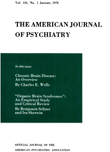A Proposed "Dangerous Sex Offender" Law
Abstract
Sex offender laws and other forms of preventive detention designed to protect the public from dangerous individuals have been criticized because of their subjectivity. The authors propose legislation that would ensure against abuse of the laws by the following means: strict definitional criteria of the dangerous sex offender in terms of predictability, requirement of proof of dangerousness, and time-limited commitments. They feel that implementation of this kind of law will restrict those incarcerated to the truly dangerous offenders and will help avoid overinclusive commitments.
Access content
To read the fulltext, please use one of the options below to sign in or purchase access.- Personal login
- Institutional Login
- Sign in via OpenAthens
- Register for access
-
Please login/register if you wish to pair your device and check access availability.
Not a subscriber?
PsychiatryOnline subscription options offer access to the DSM-5 library, books, journals, CME, and patient resources. This all-in-one virtual library provides psychiatrists and mental health professionals with key resources for diagnosis, treatment, research, and professional development.
Need more help? PsychiatryOnline Customer Service may be reached by emailing [email protected] or by calling 800-368-5777 (in the U.S.) or 703-907-7322 (outside the U.S.).



